Monsanto's Approach: Balancing Stakeholder Interests in a Case Study
VerifiedAdded on 2022/09/18
|5
|1161
|21
Case Study
AI Summary
This case study delves into Monsanto's complex endeavor of balancing the interests of its diverse stakeholders, including governments, activists, employees, farmers, investors, and advocacy groups. The analysis emphasizes the CEO's crucial role in navigating conflicts, building trust, and fostering effective communication to address the varied needs and motivations of each stakeholder group. The paper explores Monsanto's moral obligations, particularly in providing high-yield seeds, quality products, and investing in research and social sectors. It critically examines the company's challenges related to product quality, environmental impact, and the need to regain stakeholder trust, proposing strategies such as equal treatment across countries, customer service improvements, and sustainable practices. The study highlights the ethical and strategic implications of Monsanto's actions, including its approach to product safety, intellectual property, and corporate responsibility initiatives, providing a comprehensive overview of the company's past actions and future opportunities.
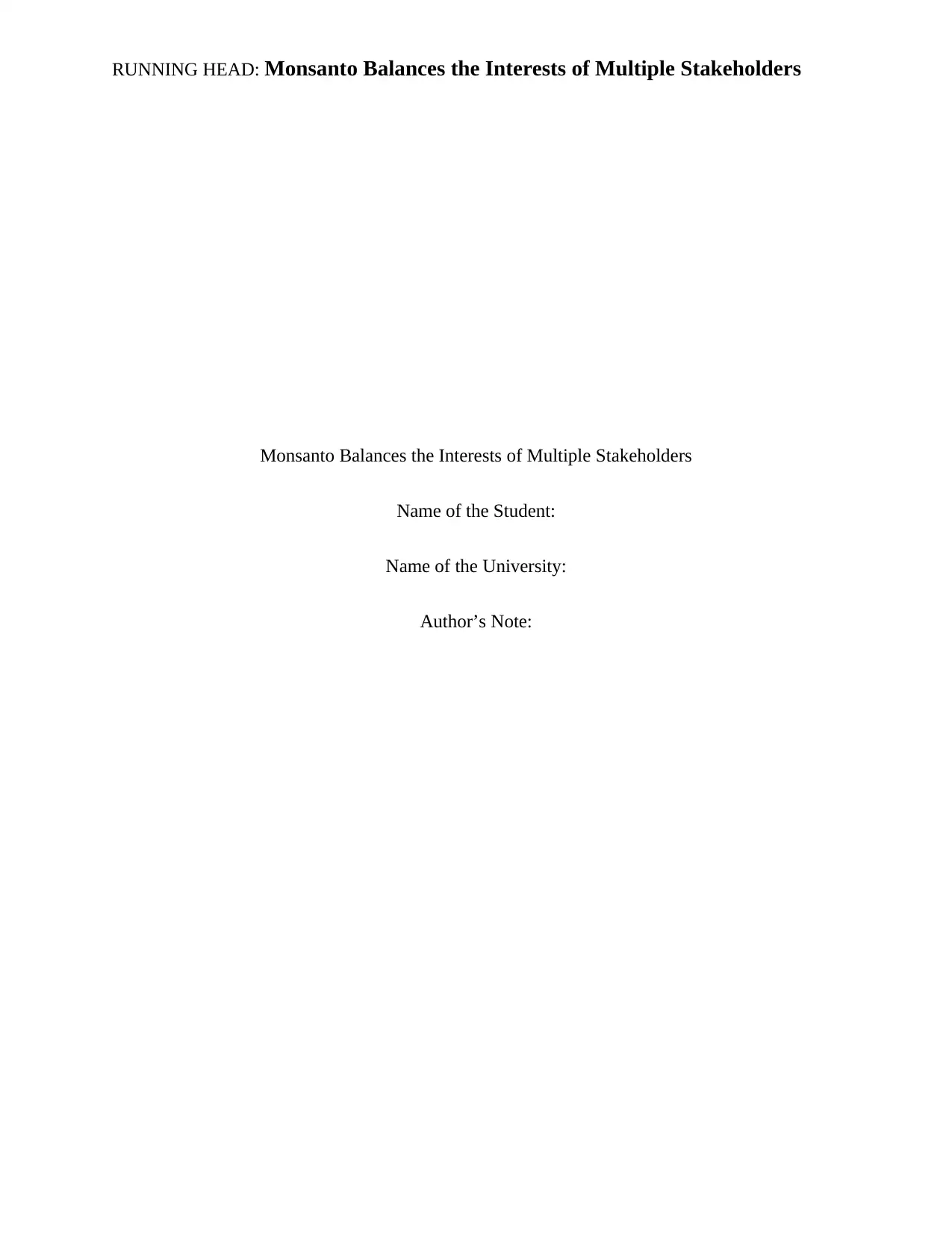
RUNNING HEAD: Monsanto Balances the Interests of Multiple Stakeholders
Monsanto Balances the Interests of Multiple Stakeholders
Name of the Student:
Name of the University:
Author’s Note:
Monsanto Balances the Interests of Multiple Stakeholders
Name of the Student:
Name of the University:
Author’s Note:
Paraphrase This Document
Need a fresh take? Get an instant paraphrase of this document with our AI Paraphraser
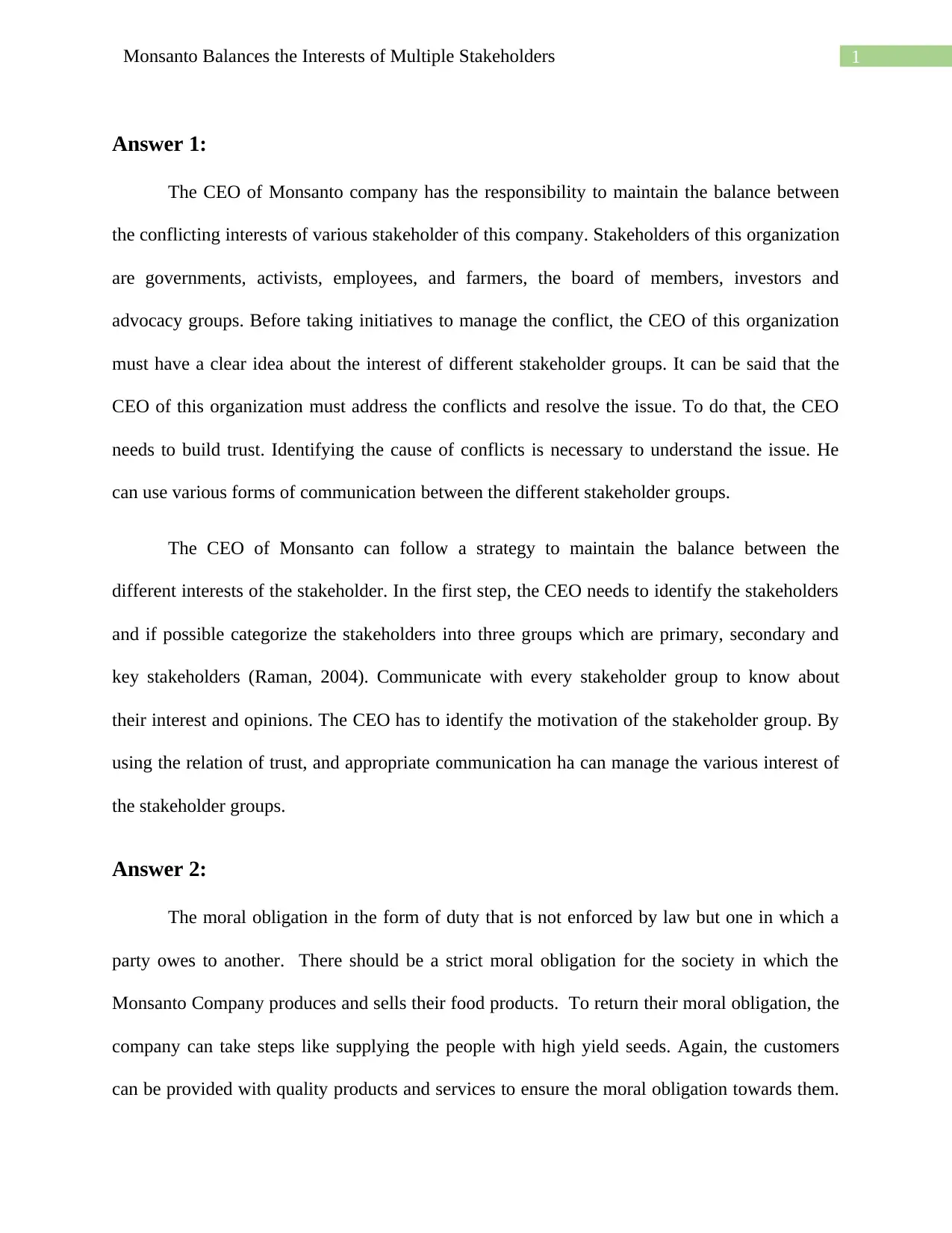
1Monsanto Balances the Interests of Multiple Stakeholders
Answer 1:
The CEO of Monsanto company has the responsibility to maintain the balance between
the conflicting interests of various stakeholder of this company. Stakeholders of this organization
are governments, activists, employees, and farmers, the board of members, investors and
advocacy groups. Before taking initiatives to manage the conflict, the CEO of this organization
must have a clear idea about the interest of different stakeholder groups. It can be said that the
CEO of this organization must address the conflicts and resolve the issue. To do that, the CEO
needs to build trust. Identifying the cause of conflicts is necessary to understand the issue. He
can use various forms of communication between the different stakeholder groups.
The CEO of Monsanto can follow a strategy to maintain the balance between the
different interests of the stakeholder. In the first step, the CEO needs to identify the stakeholders
and if possible categorize the stakeholders into three groups which are primary, secondary and
key stakeholders (Raman, 2004). Communicate with every stakeholder group to know about
their interest and opinions. The CEO has to identify the motivation of the stakeholder group. By
using the relation of trust, and appropriate communication ha can manage the various interest of
the stakeholder groups.
Answer 2:
The moral obligation in the form of duty that is not enforced by law but one in which a
party owes to another. There should be a strict moral obligation for the society in which the
Monsanto Company produces and sells their food products. To return their moral obligation, the
company can take steps like supplying the people with high yield seeds. Again, the customers
can be provided with quality products and services to ensure the moral obligation towards them.
Answer 1:
The CEO of Monsanto company has the responsibility to maintain the balance between
the conflicting interests of various stakeholder of this company. Stakeholders of this organization
are governments, activists, employees, and farmers, the board of members, investors and
advocacy groups. Before taking initiatives to manage the conflict, the CEO of this organization
must have a clear idea about the interest of different stakeholder groups. It can be said that the
CEO of this organization must address the conflicts and resolve the issue. To do that, the CEO
needs to build trust. Identifying the cause of conflicts is necessary to understand the issue. He
can use various forms of communication between the different stakeholder groups.
The CEO of Monsanto can follow a strategy to maintain the balance between the
different interests of the stakeholder. In the first step, the CEO needs to identify the stakeholders
and if possible categorize the stakeholders into three groups which are primary, secondary and
key stakeholders (Raman, 2004). Communicate with every stakeholder group to know about
their interest and opinions. The CEO has to identify the motivation of the stakeholder group. By
using the relation of trust, and appropriate communication ha can manage the various interest of
the stakeholder groups.
Answer 2:
The moral obligation in the form of duty that is not enforced by law but one in which a
party owes to another. There should be a strict moral obligation for the society in which the
Monsanto Company produces and sells their food products. To return their moral obligation, the
company can take steps like supplying the people with high yield seeds. Again, the customers
can be provided with quality products and services to ensure the moral obligation towards them.
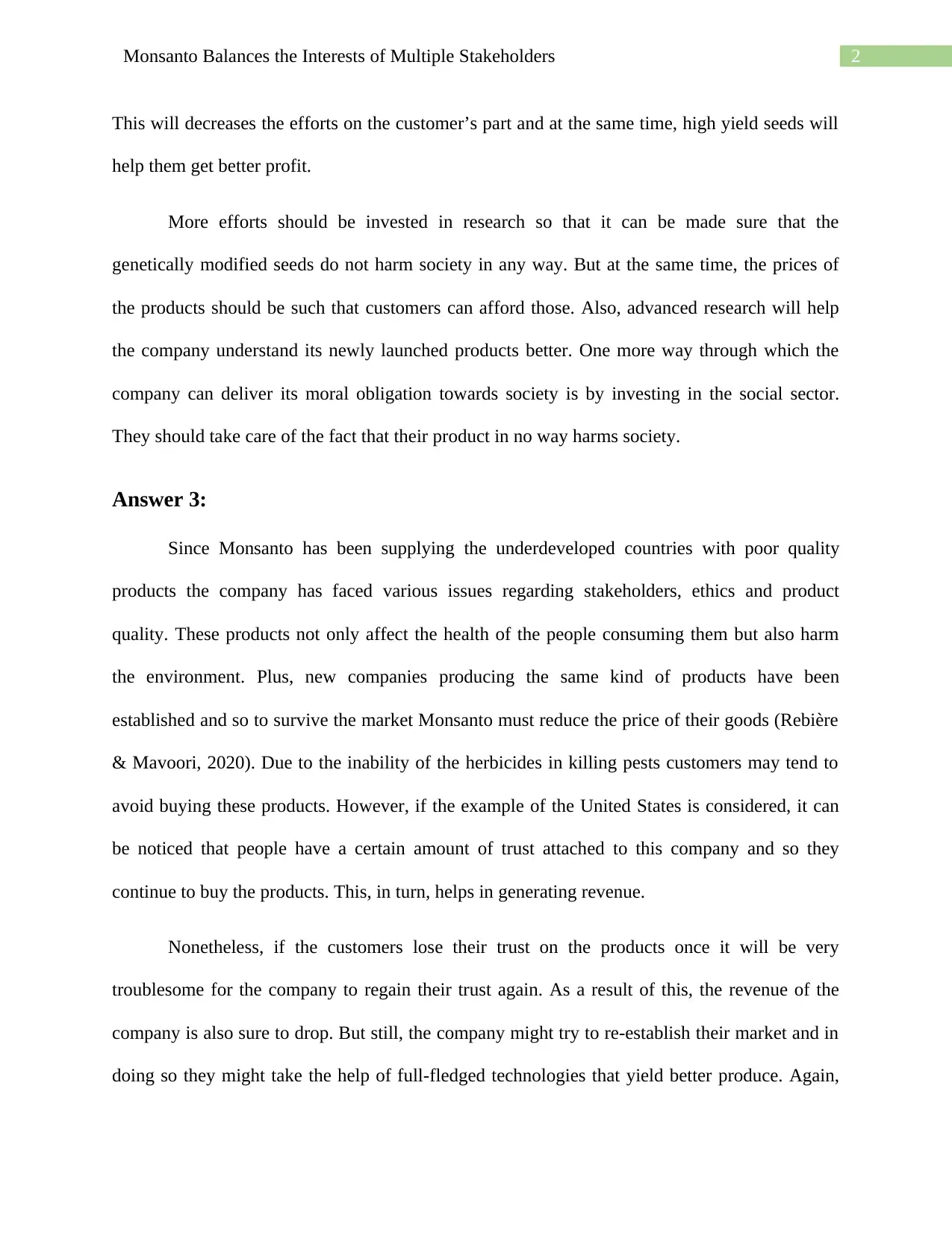
2Monsanto Balances the Interests of Multiple Stakeholders
This will decreases the efforts on the customer’s part and at the same time, high yield seeds will
help them get better profit.
More efforts should be invested in research so that it can be made sure that the
genetically modified seeds do not harm society in any way. But at the same time, the prices of
the products should be such that customers can afford those. Also, advanced research will help
the company understand its newly launched products better. One more way through which the
company can deliver its moral obligation towards society is by investing in the social sector.
They should take care of the fact that their product in no way harms society.
Answer 3:
Since Monsanto has been supplying the underdeveloped countries with poor quality
products the company has faced various issues regarding stakeholders, ethics and product
quality. These products not only affect the health of the people consuming them but also harm
the environment. Plus, new companies producing the same kind of products have been
established and so to survive the market Monsanto must reduce the price of their goods (Rebière
& Mavoori, 2020). Due to the inability of the herbicides in killing pests customers may tend to
avoid buying these products. However, if the example of the United States is considered, it can
be noticed that people have a certain amount of trust attached to this company and so they
continue to buy the products. This, in turn, helps in generating revenue.
Nonetheless, if the customers lose their trust on the products once it will be very
troublesome for the company to regain their trust again. As a result of this, the revenue of the
company is also sure to drop. But still, the company might try to re-establish their market and in
doing so they might take the help of full-fledged technologies that yield better produce. Again,
This will decreases the efforts on the customer’s part and at the same time, high yield seeds will
help them get better profit.
More efforts should be invested in research so that it can be made sure that the
genetically modified seeds do not harm society in any way. But at the same time, the prices of
the products should be such that customers can afford those. Also, advanced research will help
the company understand its newly launched products better. One more way through which the
company can deliver its moral obligation towards society is by investing in the social sector.
They should take care of the fact that their product in no way harms society.
Answer 3:
Since Monsanto has been supplying the underdeveloped countries with poor quality
products the company has faced various issues regarding stakeholders, ethics and product
quality. These products not only affect the health of the people consuming them but also harm
the environment. Plus, new companies producing the same kind of products have been
established and so to survive the market Monsanto must reduce the price of their goods (Rebière
& Mavoori, 2020). Due to the inability of the herbicides in killing pests customers may tend to
avoid buying these products. However, if the example of the United States is considered, it can
be noticed that people have a certain amount of trust attached to this company and so they
continue to buy the products. This, in turn, helps in generating revenue.
Nonetheless, if the customers lose their trust on the products once it will be very
troublesome for the company to regain their trust again. As a result of this, the revenue of the
company is also sure to drop. But still, the company might try to re-establish their market and in
doing so they might take the help of full-fledged technologies that yield better produce. Again,
⊘ This is a preview!⊘
Do you want full access?
Subscribe today to unlock all pages.

Trusted by 1+ million students worldwide
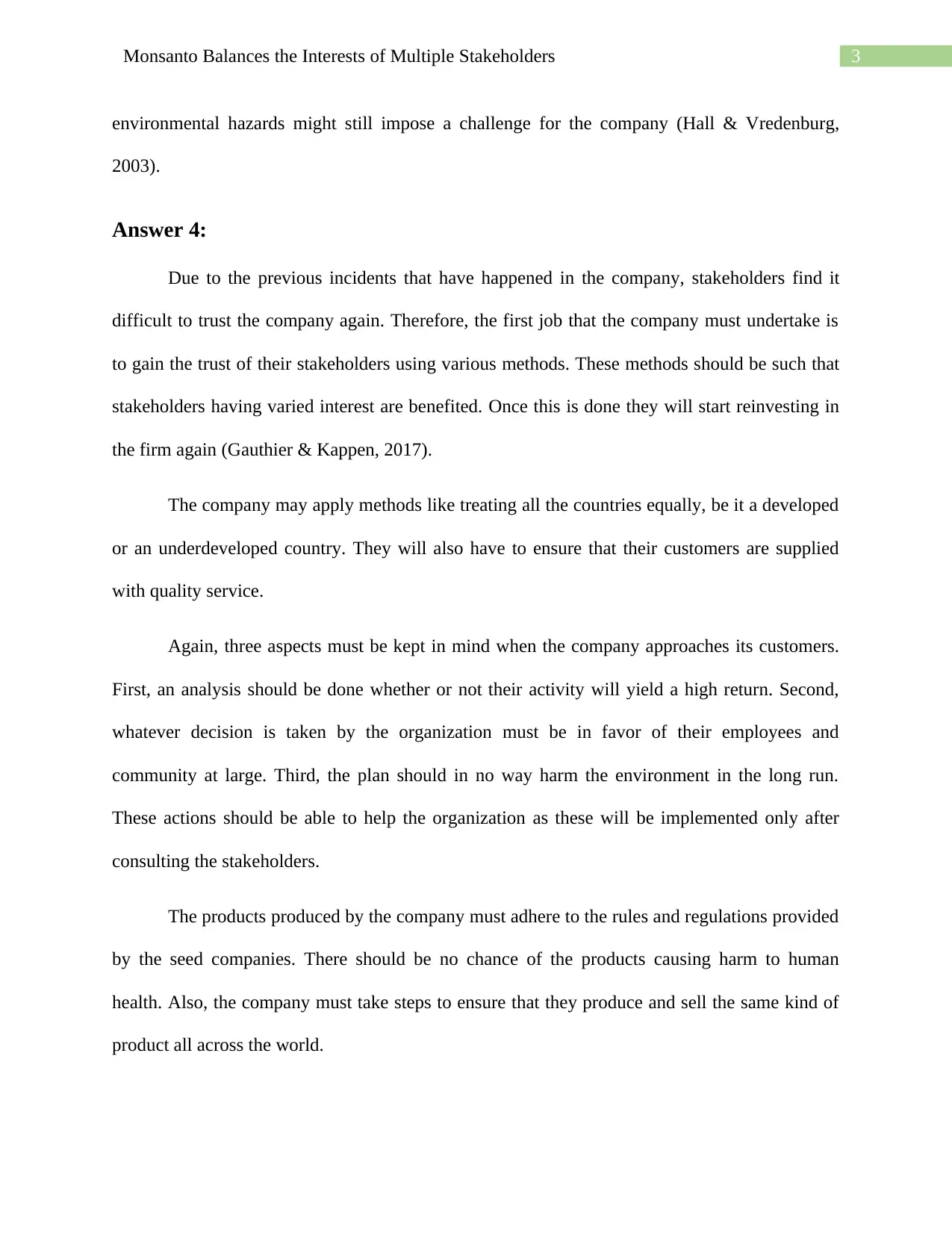
3Monsanto Balances the Interests of Multiple Stakeholders
environmental hazards might still impose a challenge for the company (Hall & Vredenburg,
2003).
Answer 4:
Due to the previous incidents that have happened in the company, stakeholders find it
difficult to trust the company again. Therefore, the first job that the company must undertake is
to gain the trust of their stakeholders using various methods. These methods should be such that
stakeholders having varied interest are benefited. Once this is done they will start reinvesting in
the firm again (Gauthier & Kappen, 2017).
The company may apply methods like treating all the countries equally, be it a developed
or an underdeveloped country. They will also have to ensure that their customers are supplied
with quality service.
Again, three aspects must be kept in mind when the company approaches its customers.
First, an analysis should be done whether or not their activity will yield a high return. Second,
whatever decision is taken by the organization must be in favor of their employees and
community at large. Third, the plan should in no way harm the environment in the long run.
These actions should be able to help the organization as these will be implemented only after
consulting the stakeholders.
The products produced by the company must adhere to the rules and regulations provided
by the seed companies. There should be no chance of the products causing harm to human
health. Also, the company must take steps to ensure that they produce and sell the same kind of
product all across the world.
environmental hazards might still impose a challenge for the company (Hall & Vredenburg,
2003).
Answer 4:
Due to the previous incidents that have happened in the company, stakeholders find it
difficult to trust the company again. Therefore, the first job that the company must undertake is
to gain the trust of their stakeholders using various methods. These methods should be such that
stakeholders having varied interest are benefited. Once this is done they will start reinvesting in
the firm again (Gauthier & Kappen, 2017).
The company may apply methods like treating all the countries equally, be it a developed
or an underdeveloped country. They will also have to ensure that their customers are supplied
with quality service.
Again, three aspects must be kept in mind when the company approaches its customers.
First, an analysis should be done whether or not their activity will yield a high return. Second,
whatever decision is taken by the organization must be in favor of their employees and
community at large. Third, the plan should in no way harm the environment in the long run.
These actions should be able to help the organization as these will be implemented only after
consulting the stakeholders.
The products produced by the company must adhere to the rules and regulations provided
by the seed companies. There should be no chance of the products causing harm to human
health. Also, the company must take steps to ensure that they produce and sell the same kind of
product all across the world.
Paraphrase This Document
Need a fresh take? Get an instant paraphrase of this document with our AI Paraphraser
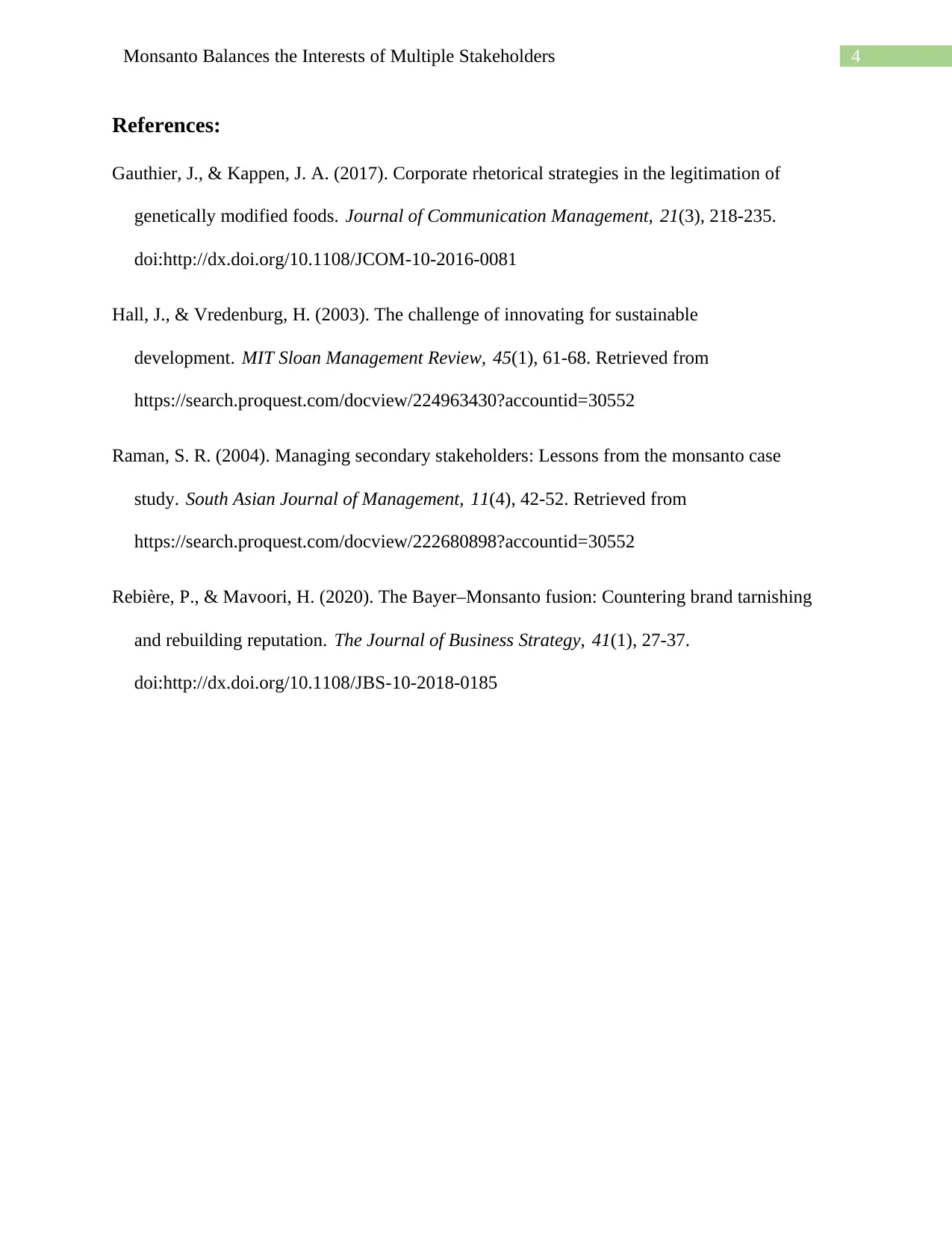
4Monsanto Balances the Interests of Multiple Stakeholders
References:
Gauthier, J., & Kappen, J. A. (2017). Corporate rhetorical strategies in the legitimation of
genetically modified foods. Journal of Communication Management, 21(3), 218-235.
doi:http://dx.doi.org/10.1108/JCOM-10-2016-0081
Hall, J., & Vredenburg, H. (2003). The challenge of innovating for sustainable
development. MIT Sloan Management Review, 45(1), 61-68. Retrieved from
https://search.proquest.com/docview/224963430?accountid=30552
Raman, S. R. (2004). Managing secondary stakeholders: Lessons from the monsanto case
study. South Asian Journal of Management, 11(4), 42-52. Retrieved from
https://search.proquest.com/docview/222680898?accountid=30552
Rebière, P., & Mavoori, H. (2020). The Bayer–Monsanto fusion: Countering brand tarnishing
and rebuilding reputation. The Journal of Business Strategy, 41(1), 27-37.
doi:http://dx.doi.org/10.1108/JBS-10-2018-0185
References:
Gauthier, J., & Kappen, J. A. (2017). Corporate rhetorical strategies in the legitimation of
genetically modified foods. Journal of Communication Management, 21(3), 218-235.
doi:http://dx.doi.org/10.1108/JCOM-10-2016-0081
Hall, J., & Vredenburg, H. (2003). The challenge of innovating for sustainable
development. MIT Sloan Management Review, 45(1), 61-68. Retrieved from
https://search.proquest.com/docview/224963430?accountid=30552
Raman, S. R. (2004). Managing secondary stakeholders: Lessons from the monsanto case
study. South Asian Journal of Management, 11(4), 42-52. Retrieved from
https://search.proquest.com/docview/222680898?accountid=30552
Rebière, P., & Mavoori, H. (2020). The Bayer–Monsanto fusion: Countering brand tarnishing
and rebuilding reputation. The Journal of Business Strategy, 41(1), 27-37.
doi:http://dx.doi.org/10.1108/JBS-10-2018-0185
1 out of 5
Related Documents
Your All-in-One AI-Powered Toolkit for Academic Success.
+13062052269
info@desklib.com
Available 24*7 on WhatsApp / Email
![[object Object]](/_next/static/media/star-bottom.7253800d.svg)
Unlock your academic potential
Copyright © 2020–2025 A2Z Services. All Rights Reserved. Developed and managed by ZUCOL.





